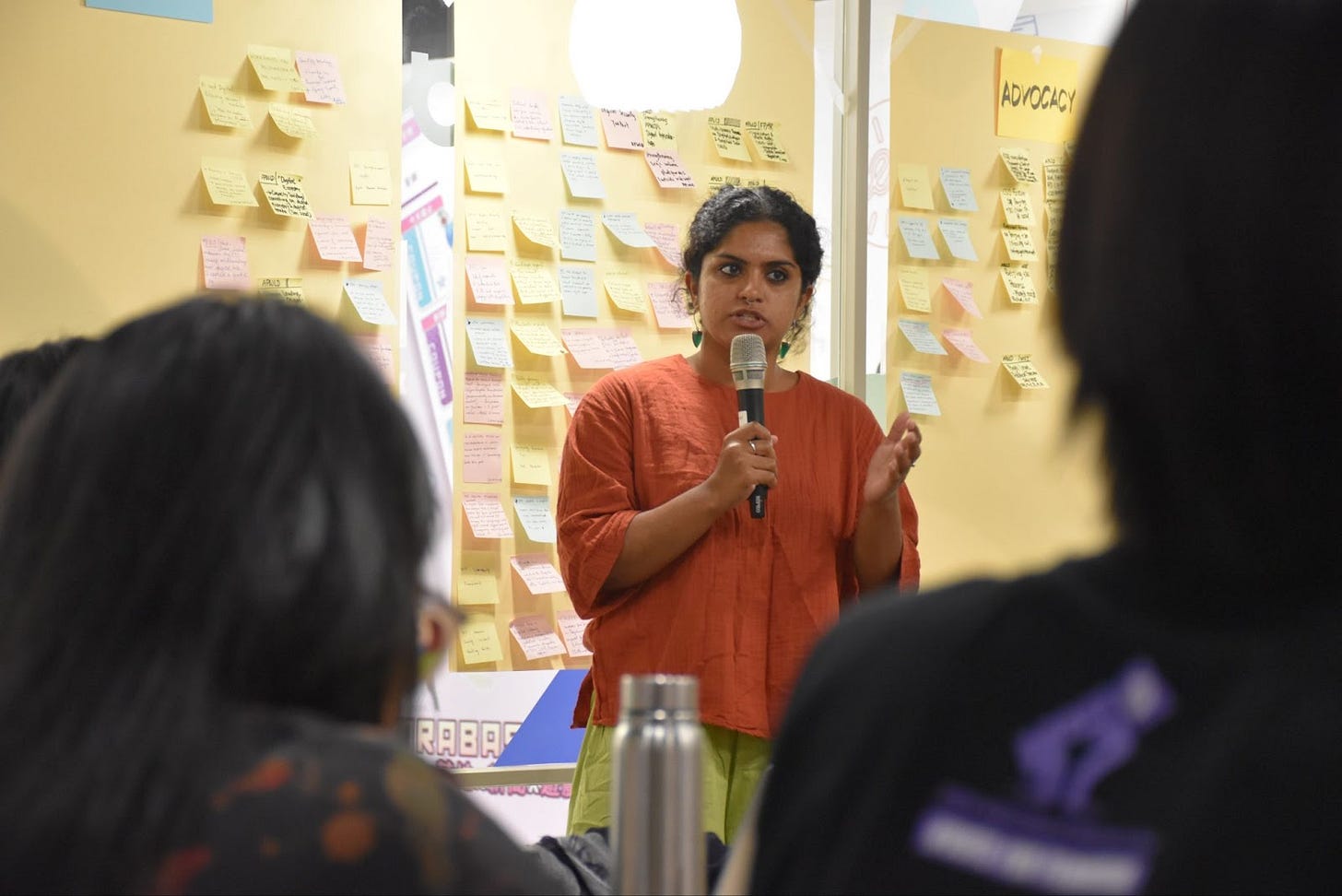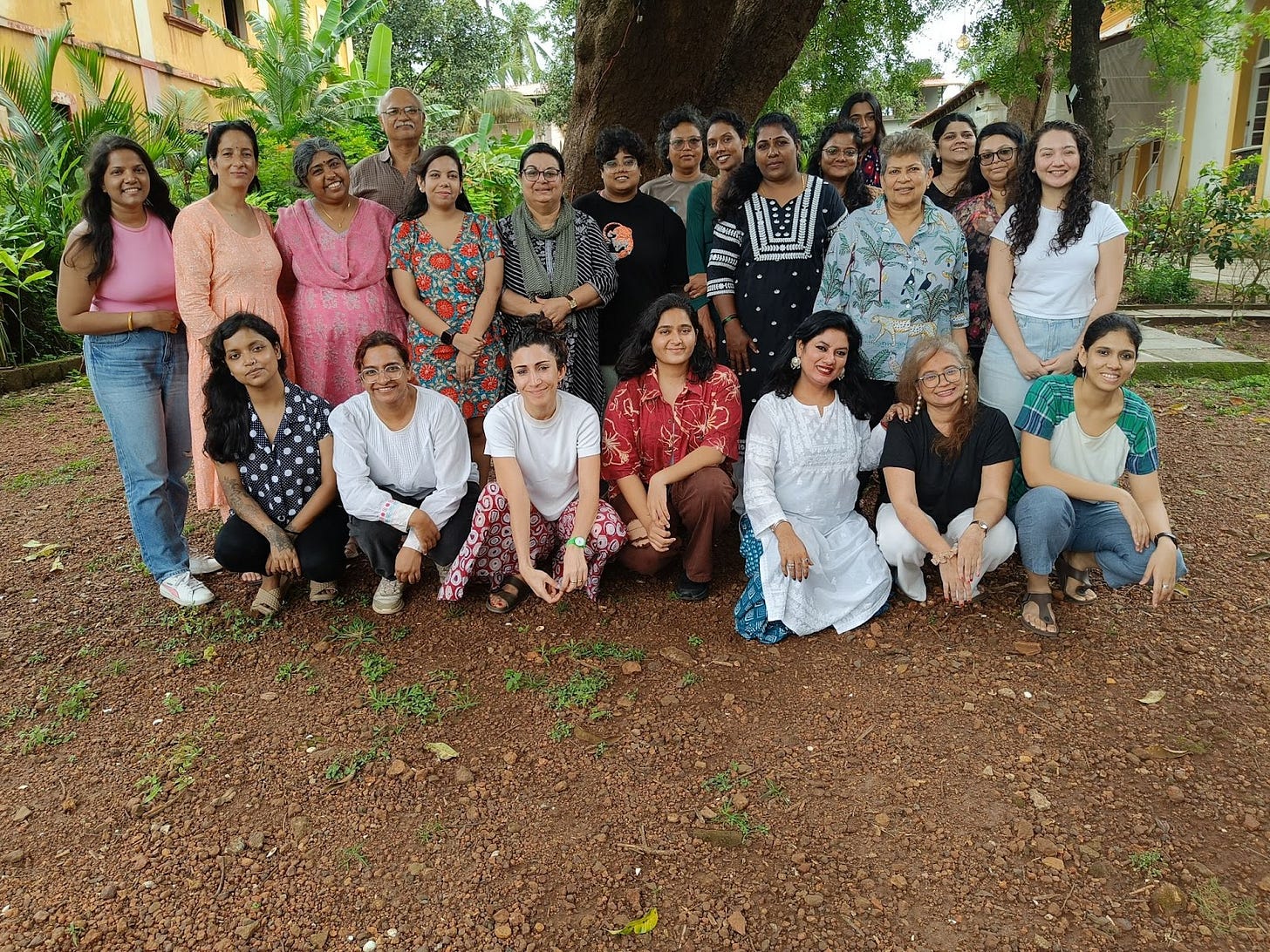Digital Futures Lab/Issue #19: Code Green, RAIL Fellowship Progress and Job Opps!
The DFL team has been making waves the last month — from tackling AI readiness, women’s digital rights and Safe DPIs in roundtable discussions and panels, to championing Responsible AI through our fellowship and curating the hottest new climate tech newsletter to hit your inboxes!
We’ve been at it, and you get to hear all about it here!
Oh, we now also have a new section in the newsletter where we feature announcements and research from our friends and colleagues. Check it out below 👇🏽
research 📑
Research Manager, Aarushi Gupta, and Research Associate, Aman Nair, cut through the hype surrounding Digital Public Infrastructure (DPI) and Digital Ecosystems in public service delivery, offering a grounded critique tailored to India's diverse sectors in ‘Assessing the Suitability of a Digital Ecosystem Approach for India’. While DPI success stories often highlight the UPI model, they overlook the critical conditions required for its success and the complexities of applying similar models to areas like healthcare and agriculture. Our newly created handbook addresses these gaps, providing key questions and prompts to help policymakers and experts critically evaluate the viability of digital ecosystems across various sectors.
Our AI + Climate Futures in Asia project is up and running - dive into our landscape report on the state of play in Asia, expert briefs from leading thinkers in the region, and foresight briefs on climate data and agriculture and policy recommendations on Responsible AI and Digital Public Goods.
For those who missed our launch event, you can find the video of the event here.
Research Associate, Dona Mathew, co-authored a policy brief on nature-based solutions and technology innovations with Pyrou Chung, Director, Knowledge for Development. The authors argue that without adequate safeguards, the integration of technology in nature-based solutions risks capture of means of knowledge production and creates technology dependencies for Indigenous and oft-marginalised communities.
Based on her participation at a workshop on Gendered Disinformation hosted by the Association for Progressive Communications, Software Freedom Law Centre, and Point of View, Research Associate, Anushka Jain, authored a blog post highlighting key takeaways. One of the issues she focused on was the spread of gendered disinformation as “digital gossip” and the harms arising from it.
Research Associate, Sasha John, wrote a blog post reflecting on the discussion around AI as a site of feminist research at APWLD’s ‘Research as Resistance: People’s Research for Movement Building in Asia Pacific’ in Chiang Mai, Thailand.
new programmes 🛣️
Responsible AI Lab (RAIL) Fellowship
We’re halfway through! We’ve hosted lectures on building a Theory of Change for AI-based interventions, planning resources and operations to incorporate AI in existing programmes, addressing bias, incorporating gender-intentional design for equity and scale and instituting responsible data practices. Most of our Fellow organisations have also completed a 1-on-1 mentoring session with at least one of the RAIL Fellowship Mentors.
We’ve gotten a first-hand look into what it takes to attempt to be responsible about AI for high-stakes use-cases - and we’re looking forward to sharing learnings, insights and best practices with the public soon!
If this sounds like something your organisation should be a part of, you can sign up here to learn when we put out a call for applications. Additionally, if you’d like DFL to conduct a session on Responsible AI practices or present some of our research to your organisation, reach out to RAIL Co-ordinator, Sasha John at sasha@digitalfutureslab.in
Code Green, in association with Earth Venture Capital
This month we launched our flagship media series, Code Green, showcasing socio-technical perspectives on climate-tech adoption in Asia. In collaboration with Earth Venture Foundation, every month we will dive deeper into AI interventions in sectors like energy and agriculture, unpacking innovation trajectories, and risks and limitations of emerging climate technologies in the region.
In our first newsletter, we explored the intersection of AI and climate action in Asia, highlighting new research and spotlighting an innovative technology use case. In the launch episode of our podcast, we spoke to leading experts, underscoring a policy, technology and finance lens to AI and climate action in the region.
events 🎤
Founder and Director, Urvashi Aneja, was a panellist on the Australia Strategic Policy Institute’s panel on AI readiness for governments, industries and societies in the Indo-Pacific, focusing on gaps in existing regulatory frameworks and concentration of power. She was joined by Japan AI Safety Institute’s Akiko Murakami and Nuix’s Jonathan Rubinsztein, with the panel moderated by Kate Seward from #TheSydneyDialogue sponsor Microsoft Australia.
Research Associate Sasha John attended the Asia Pacific Forum on Women, Law and Development’s pan-Asia roundtable discussion on “Making Digital Spaces Inclusive and Safe for Women" in Taipei, Taiwan. Participants from civil society organisations, UN consultancy organisations, and government bodies discussed the persistent challenges with larger forums not taking women’s digital rights seriously, pushed back against techno-solutionist framings of solutions to women’s issues, and a lack of fundamental understanding of technology and its impacts within stakeholders who are meant to create policy.
We recently co-hosted a workshop with Point of View to launch and socialise our report, ‘Empowering Women and Girls in Digital India: Knowledge, Policy, and Programmatic Gaps’ - supported by the American Jewish World Service. Feminist Futures Now was a 2-day workshop that focused on: 1) identifying collaborative strategies to advance digital rights and safety for women, girls, queer and trans communities in India; 2) sharing knowledge, best practices and learnings around digital rights and their interactions with gender, sexuality, and disability; & 3) building stronger networks between grassroots and tech organisations around gender and technology. Anushka conducted a session on foresight activities to build collective feminist visions of ubiquitous technology systems like Artificial Intelligence.
Dona participated in a panel discussion on “Democratising Technology for Climate Justice” organised by the Friedrich-Ebert Stiftung (FES). The discussion was part of the FES workshop “A social agenda for India” for young political leaders and trade unionists, held in Goa. The panellists discussed the opportunities and challenges of adopting technology, particularly AI, for climate action strategies in India in the context of the digital divide, data access and availability issues, and the environmental costs of resource-intensive technology.
what we’re reading 📖
Anushka
📕 Challenging The Myths of Generative AI by Tech Policy Press
Urvashi
📕 How to harness AI’s potential in research — responsibly and ethically by Nature
Shreeja
📕 California tackles digital superintelligence — maybe by Politico
from friends of DFL 👫🏼
Our colleagues at MEITY: The IndiaAI Innovation Challenge is accepting applications! under the IndiaAI Applications Development Initiative, the Challenge invites innovators and researchers to submit proposals for AI solutions that address critical socio-economic priorities across various sectors such as healthcare, agriculture, governance, and learning disabilities. Get more information and apply here!
Our 2024 RAIL Fellow, Centre for Mental Health, Law and Policy: CMHLP is looking for a Tech Lead with experience in AI + ML. Some nice-to-haves: some experience with research and interest in working in the social sector (specifically in mental health/suicide prevention). Learn more and apply here!
hiring 💼
DFL is looking to hire a Goa-based Events and Operations intern for October - December! Check out the JD here.
Apply by 27th September, 2024!
coming up ⏩️
In the next edition of Code Green we cover the use of AI in Asia’s energy sector. It highlights emerging innovation opportunities in the region, while surfacing key tensions around energy equity, data privacy and security. Subscribe here!
We have wrapped up our research on gender-related issues across the across the development lifecycle of LLM applications in India and are excited to share the outputs of that research with you very soon! Stay tuned!
Have an idea for creative collaboration, a future Tech and Society Dialogues event or a research partnership? Reach out to our Public Engagement Manager, Sasha John, at sasha@digitalfutureslab.in or @SashaEmJay on Twitter.
Follow Digital Futures Lab on Twitter, LinkedIn & Instagram!


